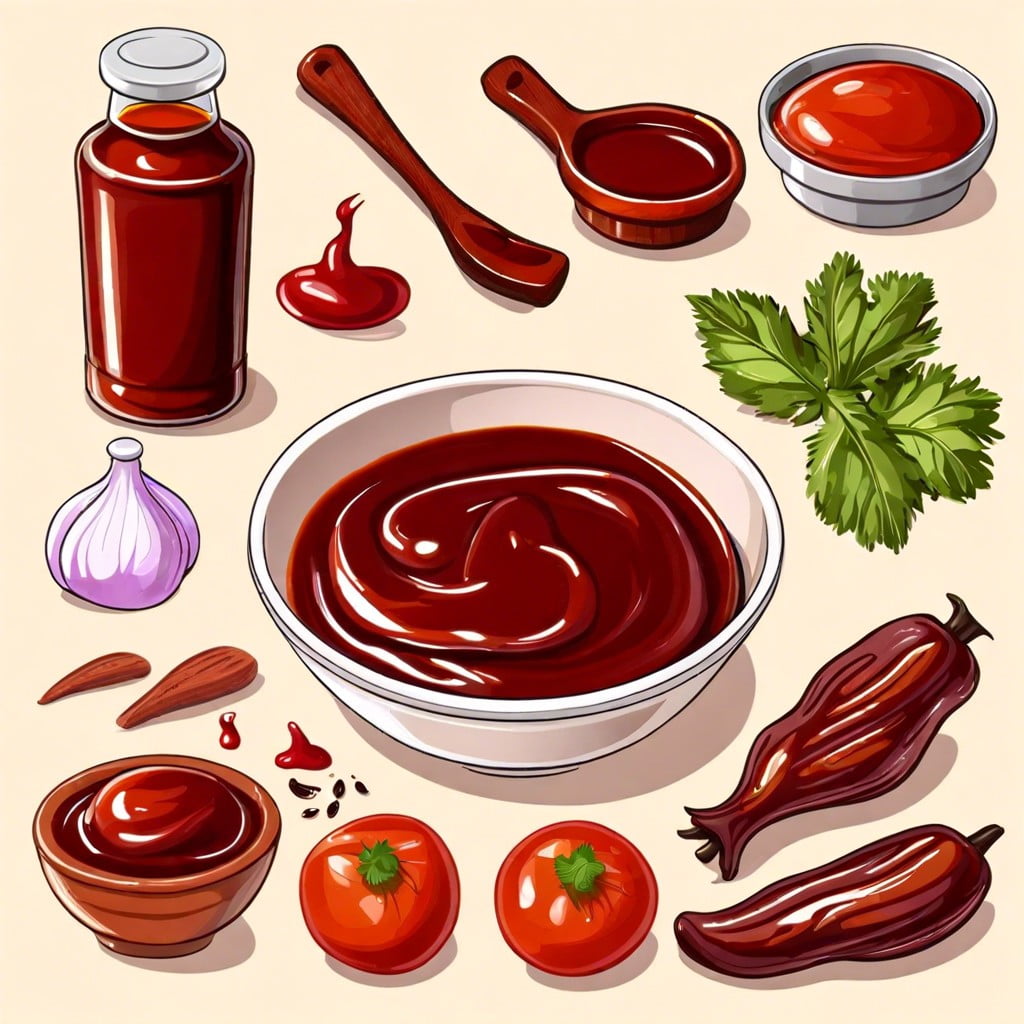Learn how to craft a delicious homemade BBQ sauce with customizable flavors to elevate your grilling and smoking dishes.
Key takeaways:
- BBQ sauce ingredients: tomatoes, sweetness, acidity, Worcestershire/soy sauce, spices.
- Making BBQ sauce: simmer ingredients for depth of flavor.
- Adjust condiments to taste for a personalized sauce.
- Analyze consistency: thickening or thinning if necessary.
- Serve BBQ sauce with grilled meats, veggies, or as a dip.
What Is Barbecue Sauce Made Of?

The composition of barbecue sauce is a symphony of flavor components that can be adjusted to suit personal taste. At its core, the sauce usually includes a base of tomatoes—often ketchup for ease and consistency. Sweetness is typically delivered via brown sugar, molasses, or honey, which balance smoky notes and acidity, with the latter frequently sourced from vinegar or lemon juice.
Depth of flavor comes from Worcestershire sauce or soy sauce, and spices like garlic powder, onion powder, smoked paprika, and a hint of cayenne pepper add complexity and heat. Mustard may also be incorporated for tang and texture. The beauty of homemade sauce lies in its adaptability; ingredients can be measured, tweaked, and played with until the perfect harmony of sweet, tangy, spicy, and smoky is achieved.
How to Make Barbecue Sauce
Begin by gathering your base ingredients: a quality ketchup for a classic style or tomato paste for a richer, more concentrated flavor. Sweetness is typically provided by brown sugar, molasses, or honey, while apple cider vinegar or lemon juice delivers the requisite tang. Balance these with your preferred spices: paprika, garlic powder, onion powder, and a touch of cayenne pepper for heat.
Creating a barbecue sauce is a harmonious blend of these components. Start by combining them in a saucepan over medium heat. The key is to allow the mixture to simmer gently, melding the flavors together—usually for about 20 to 30 minutes. Remember, patience is crucial, as a slow simmer gives the flavors time to deepen and intensify.
Next, remember that precision is less important than your personal taste when making barbecue sauce. Trust your palate and adjust the condiments as you go. A splash more vinegar can cut through the sweetness, a bit more sugar can soften too much heat, and additional spices can be the difference between a good sauce and a great one.
The final step is to analyze the consistency. A sauce that’s too thin can be thickened with a simmer, while a quick splash of water can address one that’s too thick. Effective barbecue sauce should coat the back of a spoon but pour easily.
Once perfected, use the sauce immediately to baste meats on the grill or allow it to cool before transferring it to an airtight container for storage. Remember, homemade barbecue sauce is a dynamic condiment, open to interpretation and readily adaptable to suit any grillmaster’s palate.
Common Questions About Homemade BBQ Sauce
Can I substitute ingredients in homemade BBQ sauce? Absolutely. Tailoring to personal taste or dietary needs is one of the benefits of making your own sauce. For example, apple cider vinegar can often be swapped for other types like balsamic for a different flavor profile. Sweeteners are particularly flexible – brown sugar, honey, and maple syrup can all be used to varying effects.
Is homemade BBQ sauce healthier than store-bought? Frequently, yes. Homemade sauces often contain less sugar and sodium than their commercial counterparts and lack preservatives and artificial flavorings. You’re in control of what goes into your sauce, allowing you to make healthier choices.
How long does homemade BBQ sauce last? Typically, if properly stored in an airtight container in the refrigerator, homemade BBQ sauce can last up to two weeks. For longer storage, freezing is an option, but beware that it may slightly alter the sauce’s texture or flavor upon thawing.
Can I make BBQ sauce without ketchup? Certainly. While ketchup provides a convenient base for many sauces, you can start with tomato sauce or tomato paste for a less processed foundation. Adjust the sweetness and spices to compensate for the lack of ketchup’s characteristic tang and flavor.
What’s the best way to thicken BBQ sauce? Simmering is the most effective technique to achieve the desired thickness as it allows excess water to evaporate. If further thickening is needed, a slurry of cornstarch and water is a quick fix. Remember to simmer and stir until the cornstarch taste cooks out.
Serve BBQ Sauce With
BBQ sauce is the ultimate condiment for enhancing the flavors of various dishes.
Its tangy sweetness pairs impeccably with classic grilled meats like pork ribs, brisket, and chicken.
For a twist, incorporate it into a brisket or pulled pork sandwich, ensuring each bite is laden with flavor.
Vegetarians can use it to glaze grilled vegetables or as a dipping sauce for veggie burgers and tofu.
Try blending BBQ sauce with mayonnaise or sour cream to create a unique dip for fries, onion rings, or even as a bold salad dressing.
Remember, the versatility of homemade BBQ sauce is only limited by your culinary creativity.
How to Store Barbecue Sauce
Proper storage is crucial for maintaining the flavor and safety of your homemade barbecue sauce. Once cooled, transfer the sauce to an airtight container, and refrigerate. The cool temperature slows down bacterial growth and preserves the sauce’s quality. It’s typically safe for up to one week when properly stored.
For longer preservation, consider freezing the sauce in small portions. Use ice cube trays or freezer bags to portion it out. This method not only extends the shelf life for up to three months but also offers convenience — you can thaw only what you need for a single meal.
Remember to leave a bit of headspace when storing in containers, as liquids expand when frozen. Always label and date the contents to keep track of their shelf life. When it’s time to use the sauce, thaw it in the refrigerator overnight or use a microwave for a quicker option. Stir well before serving to ensure all the ingredients are well combined after storage.

